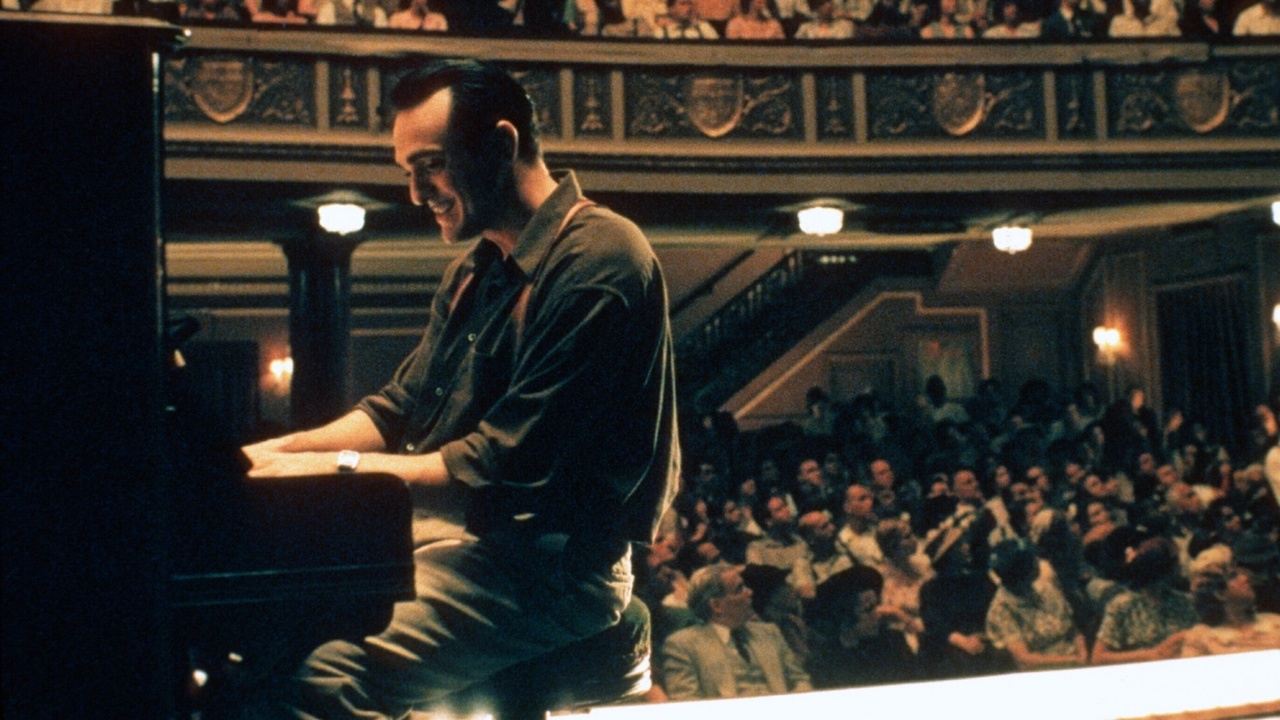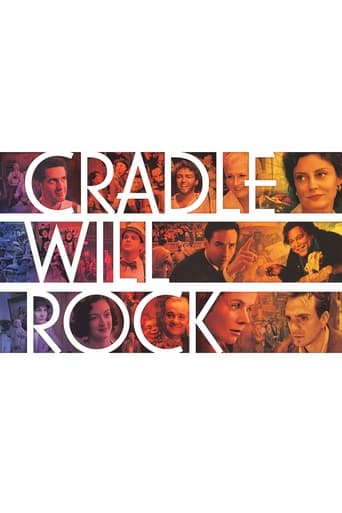



Truly Dreadful Film
good back-story, and good acting
In truth, there is barely enough story here to make a film.
View MoreIt is neither dumb nor smart enough to be fun, and spends way too much time with its boring human characters.
View More...a really smart, well-constructed script by Tim Robbins (who also directed) that links the Depression 30s, performing arts, visual arts, commerce, politics, business and the culture (whew!). Robert Altman would be proud at how all these strands came together with great force. The performances are great (Redgrave, the Cusacks, Bill Murray, Cary Elwes, McFadyen, Blades, Cherry Jones, Azaria) all lovingly presented. The art direction and cinematography are impeccable, and the re-creation of the first "performance" of "the runaway opera" is astonishingly accurate - at least in line with the way Houseman tells it in his memoir, "Run-Through." CRADLE's blend of real and fictional characters and historical fact and fiction makes for a piece of stirring, funny, thoughtful storytelling of an important moment in American history.
View MoreTim Robbins' Cradle Will Rock is an interesting movie about real-life social issues, politics, the arts, and events during the Great Depression era. This movie chronicles an important time in 20th century United States history when the collapse of the Stock Market lead to a high unemployment rate that affected the lives of many families. People faced desperation through starvation, homelessness, and intense competition during the shortage of jobs. In addition to economic and employment woes, this was a climate that increasingly bred uncertainty about the future, suspicions about outside threats to capitalism and democracy (specifically, the movie addresses communism and fascism), and concerns regarding censorship of artistic expression and freedom of speech. This movie cleverly examines all of these matters while primarily following the creation of the actual Cradle Will Rock musical production during the era. Sponsored by the Federal Theatre Project (FTA) under the Works Progress Administration (WPA) in the United States, the film focuses on a rich ensemble of characters (involved in the arts, theatre, and otherwise). According to this web site (http://memory.loc.gov/ammem/fedtp/ftwpa.html), the FTP was responsible for bringing theatre to millions of citizens throughout the United States, financially supported the growth of theatres, and provided opportunities for theatre professionals. In the real Cradle Will Rock, the playwright Marc Blitzstein wrote about the social and political issues of the era, especially surrounding labor and unions. The political nature of this lead to the controversy touched upon by the film. During the political climate that fostered growing suspicions about perceived threats to the American way of life, Robbins' brings to the screen a historically-based account about how the arts were specifically challenged and alleged as a medium to spread what were considered dangerous messages against American ideals. In particular, the motives and agendas of artists were questioned and suppressed under intense scrutiny. Robbins' Cradle Will Rock presents the realities of this era blended with just the right balance of exposition, drama, and comedic elements. The humor lightens the mood but does not distract from the seriousness of the situations faced by people during this era. The characters are presented with realism that transports you into the struggles and triumphs of their lives. Although the ensemble of characters was interesting, there could have been more depth in some instances. For instance, there were many great sub-plots that were only briefly touched upon. However, to be fair, the goal of this film was probably not to cram an in-depth examination of their lives, so much as it was to utilize the spectrum of characters to showcase diversity in their experiences. In this, we are exposed to a variety of ideals and values, individual and family experiences, and contrasts between the struggling working class and the elite. Center stage is the question surrounding the definitions of American values, ideals, as well as the boundaries of artistic expression. This is definitely one of those movies where some may gain a greater appreciation if they can view it a second time. There is a lot going on with the variety of characters and issues this film examines. This is not a dry, dull historical account, but rather a surface inspection of the Depression era and a country with challenging social and political issues. Viewers may want to enhance their understanding of the events touched upon by the film by learning more about the real, historical events. For instance, we only receive a few, although effective, examples of what people experienced during the climate of the Red Scare. Finally, Robbins' Cradle Will Rock will probably challenge many to think about the potential pros and cons of government response during social and political issues. For instance, the WPA and FTP improved the lives of millions of United States citizens; however, the paranoia surrounding the suspected infiltration of anti-American principles shadowed these accomplishments.
View MoreA wonderful, large cast recreates the story behind "The Cradle Will Rock" in this 1999 film, written and directed by Tim Robbins and starring Hank Azaria, Ruben Blades, Joan Cusack, John Cusack, Bill Murray, Cherry Jones, John Turturro, Vanessa Redgrave, Susan Sarandon, Jamey Sheridan, Gretchen Mol, Emily Watson, Bob Balaban - etc.Before the Depression and the turbulence of the 1930s, plays focused on the upper class. Everyone talked like Katharine Hepburn and people wore beautiful clothes. In the 1930s, the working man began to have a voice with the works of William Sarayoan, Clifford Odets, and Maxwell Anderson, among others. During the Depression, FDR started the WPA, and the Federal Theatre Project was one of its programs. "The Cradle Will Rock" is a leftist labor musical by Marc Blitzstein that is chosen by Hallie Flanagan, head of the FTP, to premiere at the Maxine Elliott Theater in New York. The politics of the FTP come under question, the theater is locked, and the actors are forbidden to appear on stage.Orson Welles finds another theater for the production, and the story of the opening night performance, spontaneously performed by the cast from the audience as Blitzstein sat up on stage and played, was thought to be one of the most exciting moments in theater history by those who were there.Robbins focuses on the controversy surrounding the musical but also on several other important events. Maybe, in the end, it is too much content, but fascinating nonetheless. Diego Rivera, an avowed Communist, played by Ruben Blades, is hired by Nelson Rockefeller (John Cusak) to paint a mural at Rockefeller Center. Rockefeller, however, doesn't like the revolutionary tone of the mural. One of the actors, played by John Turturro, has to deal with a family that supports Mussolini's Black Shirts.Marc Blitzstein, in focusing on a prostitute in "The Cradle Will Rock," asks us who the real prostitutes are, and Robbins shows us in his depictions of Rockefeller, Hearst, and the Senate committee before which Hallie Flanagan testifies, the thin and sometimes nonexistent line between art and politics.The performances are terrific. Just about everyone is a standout, with John Turturro in an especially showy role as a man who wants to demonstrate principles and ethics to his children. Ruben Blades and Corina Katt Ayala could have been Rivera and Frida Kahlo, the resemblance is so strong. Vanessa Redgrave is excellent as Countess LaGrange, a wealthy woman who gets caught up in the proceedings. The gifted Broadway star Cherry Jones gives another strong performance as Hallie Flanagan, and Emily Watson is marvelous as Olive Stanton. The minute I heard the vocal rhythm of Angus Macfadyen, I knew he was playing Orson Welles. He does a beautiful job, as does Susan Sarandon as Margherita Sarfatti, Mussolini's ex-mistress who came to the U.S. to sell Mussolini to the American people via William Randolph Hearst's newspapers.Well worth seeing, and the period is well worth reading about.
View MoreAn all-star production, CRADLE WILL ROCK chronicles the events leading up to the debut of Mark Blitzstein's "The Cradle Will Rock," a labor-oriented drama with music, written in the turbulent 1930s. It is to be performed at the WPA Federal Theater, but the government gets cold feet at the last minute and closes the theater. So the players take their production to a private theater and perform before an SRO crowd. Oddly enough, the performance turns out to be the least interesting part of the film, done up in a "Let's fix up the old barn and put on a show" routine seen in countless Andy Hardy and Little Rascals films. It is what happens before that is fascinating, as we shift back and forth between New York and Washington and are exposed to the "isms" of this post Depression/pre-WWII time: communism and fascism. One supposes most of what writer/director Tim Robbins portrays here is real enough, but keep in mind Robbins is an avowed leftist and so the film is probably best taken with a large dose of salt. But what a cast: John and Joan Cusack, Susan (Mrs. Tim Robbins) Sarandon, Cary Elwes, John Turturro, Jack Black, Bill Murray, Vanessa Redgrave, Ruben Blades and Hank Azaria. All play real-life figures of the era, including Orson Welles and John Rockefeller. A must-see for art-house film lovers and those interested in the period. All others, beware.
View More